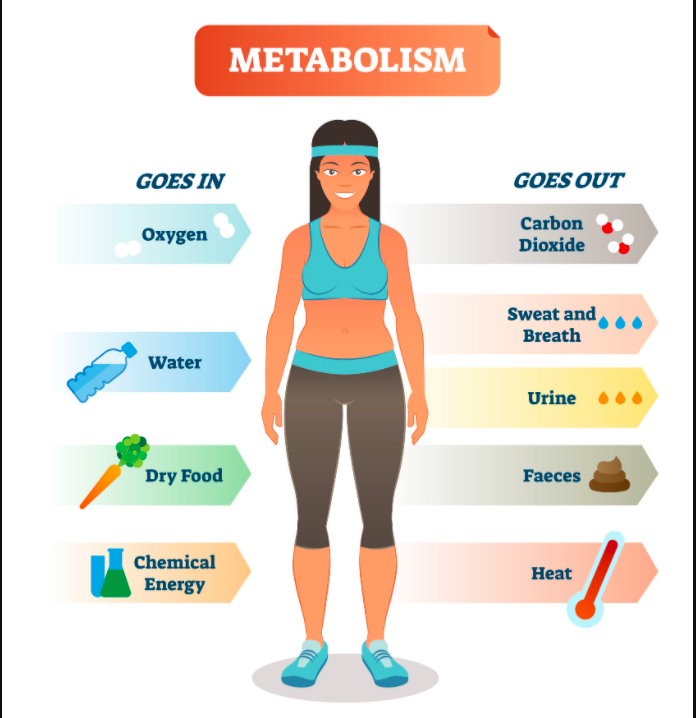The human metabolism, a complex system of chemical processes that sustain life, plays a pivotal role in energy regulation, weight management, and overall well-being. However, various factors in our modern lifestyle can contribute to the detriment of our metabolism, leading to potential health issues.

Let’s delve into the key elements that might be negatively impacting our metabolism, hindering its efficiency and balance
Sedentary Lifestyle
One of the primary contributors to a sluggish metabolism is a sedentary lifestyle. Modern conveniences, such as desk jobs, prolonged screen time, and a lack of physical activity, have become pervasive. Physical inactivity not only reduces the number of calories burned but also affects the body’s ability to regulate insulin and glucose levels. Regular exercise, including both aerobic and strength training, is essential for maintaining a healthy metabolism.
Poor Dietary Habits
Nutrition plays a crucial role in metabolism, and poor dietary habits can significantly impact its efficiency. Diets high in processed foods, refined sugars, and unhealthy fats contribute to weight gain and insulin resistance, both of which are detrimental to metabolic health. Additionally, skipping meals or drastically reducing caloric intake can signal the body to enter a “starvation mode,” slowing down metabolism as a survival mechanism. A balanced diet rich in whole foods, fiber, and adequate protein is essential for supporting a healthy metabolism.
Lack of Sleep
Quality sleep is integral to overall health, and its impact on metabolism should not be underestimated. Sleep deprivation has been linked to disruptions in hormonal balance, particularly an increase in ghrelin (hunger hormone) and a decrease in leptin (satiety hormone). These hormonal shifts can lead to increased cravings for high-calorie foods and a tendency to overeat, contributing to weight gain and metabolic dysfunction.

Chronic Stress
Chronic stress triggers the release of cortisol, a hormone that plays a role in the body’s fight-or-flight response. While acute stress is a natural and adaptive response, chronic stress can lead to elevated cortisol levels, promoting abdominal fat storage and insulin resistance. Over time, this can impair metabolic function and increase the risk of metabolic disorders such as Type 2 diabetes. Adopting stress-reduction techniques, such as mindfulness, meditation, and regular relaxation practices, is crucial for supporting metabolic health.

Dehydration
Proper hydration is essential for optimal metabolic function. Dehydration can slow down various metabolic processes, affecting the breakdown of carbohydrates, fats, and proteins. Additionally, staying well-hydrated supports thermogenesis, the process by which the body produces heat and burns calories. Drinking an adequate amount of water throughout the day is essential for maintaining metabolic efficiency.
Aging
Metabolism naturally slows down with age due to a decrease in muscle mass and changes in hormonal levels. The reduction in muscle mass lowers the basal metabolic rate (BMR), the number of calories the body needs at rest. Hormonal changes, such as declining levels of growth hormone and estrogen in women during menopause, also influence metabolism. While aging is inevitable, adopting a healthy lifestyle, including regular exercise and a balanced diet, can mitigate some of the age-related declines in metabolic function.
Environmental Toxins
Exposure to environmental toxins, such as endocrine-disrupting chemicals found in certain plastics, pesticides, and pollutants, has been linked to metabolic disturbances. These substances can interfere with hormonal signaling and contribute to insulin resistance. Minimizing exposure to environmental toxins through conscious lifestyle choices, such as choosing organic foods and reducing the use of plastic, may help support metabolic health.
Lack of Protein
Protein plays a crucial role in metabolic function. It contributes to the thermic effect of food, meaning the body expends energy to digest and metabolize it. Additionally, protein helps maintain muscle mass, and a higher muscle mass is associated with a higher BMR. Insufficient protein intake can lead to muscle loss and a decrease in metabolic rate. Including protein-rich foods in the diet, such as lean meats, fish, legumes, and dairy, is essential for supporting metabolic health.
Medical Conditions
Certain medical conditions can impact metabolism and contribute to metabolic dysfunction. Conditions such as hypothyroidism, polycystic ovary syndrome (PCOS), and hormonal imbalances can affect metabolic rate and insulin sensitivity. Managing and treating underlying medical conditions in consultation with healthcare professionals is crucial for supporting metabolic health.
Yo-Yo Dieting
Engaging in frequent or extreme dieting, often referred to as yo-yo dieting, can have a detrimental impact on metabolism. Rapid weight loss followed by regain can lead to a loss of lean muscle mass, which in turn lowers BMR. The body may become more efficient at storing calories as fat, anticipating future periods of caloric restriction. Adopting sustainable and balanced dietary habits, rather than resorting to extreme diets, is key to maintaining a healthy metabolism.
In conclusion, our modern lifestyle, characterized by sedentary behavior, poor dietary choices, and chronic stress, can contribute to the sabotage of our metabolism. Recognizing these factors and making conscious efforts to address them through regular physical activity, a balanced diet, adequate sleep, and stress management can empower individuals to support and enhance their metabolic health. Moreover, understanding the interplay between lifestyle choices and metabolic function is crucial for making informed decisions that contribute to overall well-being and long-term happiness.
(Disclaimer: The information given here is based on general information. Before adopting it, definitely take medical advice. THE MONK does not confirm this.)






































